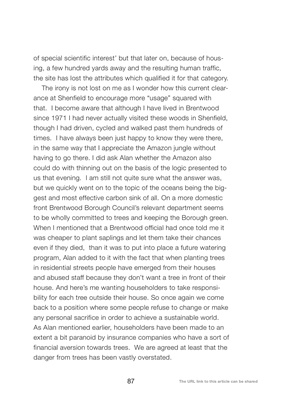
87
of special scientific interest' but that later on, because of housing,
a few hundred yards away and the resulting human traffic,
the site has lost the attributes which qualified it for that category.
The irony is not lost on me as I wonder how this current clearance
at Shenfield to encourage more "usage" squared with
that. I become aware that although I have lived in Brentwood
since 1971 I had never actually visited these woods in Shenfield,
though I had driven, cycled and walked past them hundreds of
times. I have always been just happy to know they were there,
in the same way that I appreciate the Amazon jungle without
having to go there. I did ask Alan whether the Amazon also
could do with thinning out on the basis of the logic presented to
us that evening. I am still not quite sure what the answer was,
but we quickly went on to the topic of the oceans being the biggest
and most effective carbon sink of all. On a more domestic
front Brentwood Borough Council's relevant department seems
to be wholly committed to trees and keeping the Borough green.
When I mentioned that a Brentwood official had once told me it
was cheaper to plant saplings and let them take their chances
even if they died, than it was to put into place a future watering
program, Alan added to it with the fact that when planting trees
in residential streets people have emerged from their houses
and abused staff because they don't want a tree in front of their
house. And here's me wanting householders to take responsibility
for each tree outside their house. So once again we come
back to a position where some people refuse to change or make
any personal sacrifice in order to achieve a sustainable world.
As Alan mentioned earlier, householders have been made to an
extent a bit paranoid by insurance companies who have a sort of
financial aversion towards trees. We are agreed at least that the
danger from trees has been vastly overstated.
The URL link to this article can be shared